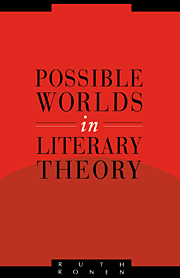Book contents
- Frontmatter
- Contents
- Acknowledgments
- Introduction
- 1 Possible worlds, fictional worlds
- 2 The possibility of fictional worlds
- 3 The Fictionality of fictional worlds
- 4 Fictional entities, incomplete beings
- 5 Fictional events and the intricacies of plot
- 6 Focalization and fictional perspective
- 7 Fictional time
- Conclusion
- Bibliography
- Index
2 - The possibility of fictional worlds
Published online by Cambridge University Press: 12 November 2009
- Frontmatter
- Contents
- Acknowledgments
- Introduction
- 1 Possible worlds, fictional worlds
- 2 The possibility of fictional worlds
- 3 The Fictionality of fictional worlds
- 4 Fictional entities, incomplete beings
- 5 Fictional events and the intricacies of plot
- 6 Focalization and fictional perspective
- 7 Fictional time
- Conclusion
- Bibliography
- Index
Summary
Possible worlds between the disciplines
The concept of possible worlds has, in recent years, served as an interdisciplinary metaphor representing a sphere of mutual fusion and interchange between philosophical logic, philosophy of science, literary theory, aesthetics and linguistics. This interdisciplinary interchange has been based on the presupposition of a common ground to which the various disciplines refer; that is, possible worlds serve as a common point of reference where problems raised by each discipline separately seem to converge. Yet this dialogue among the disciplines is more intricate than it seems, because talk about possible worlds turns out to be talk about different things in each particular discipline. This is due to the nature of the disciplines involved, which dictates a priori a unique set of problems to which possible worlds are applied, and a substantially different interpretation of the concept. Possible worlds present an intricate case whereby a concept originating in one discipline develops into an interdisciplinary tool, extending in the process its scope of application and undergoing substantial changes of meaning.
Possible worlds function as an exemplary case since the gradual metaphorization of a cross-border concept or paradigm is typical and inevitable. Each discipline has its own “self-referential” mechanism necessitating such a change of meaning. Whereas the previous chapter dealt with the reasons underlying the cross-disciplinary interchange between philosophy and literary theory around the concept of possible worlds, in this chapter I shall concentrate on the unique and incompatible interpretation attached to possible worlds by each discipline.
- Type
- Chapter
- Information
- Possible Worlds in Literary Theory , pp. 47 - 75Publisher: Cambridge University PressPrint publication year: 1994

